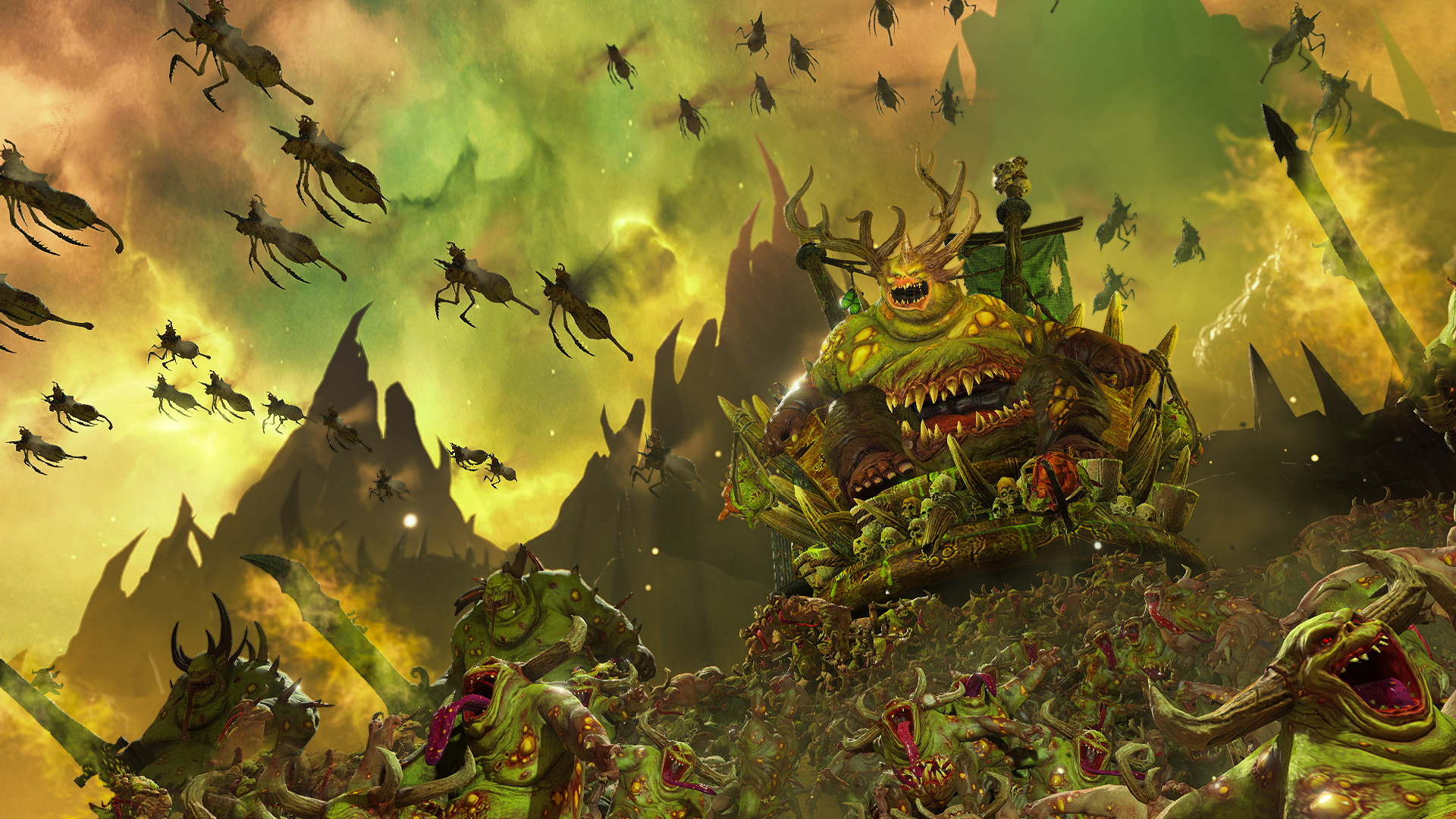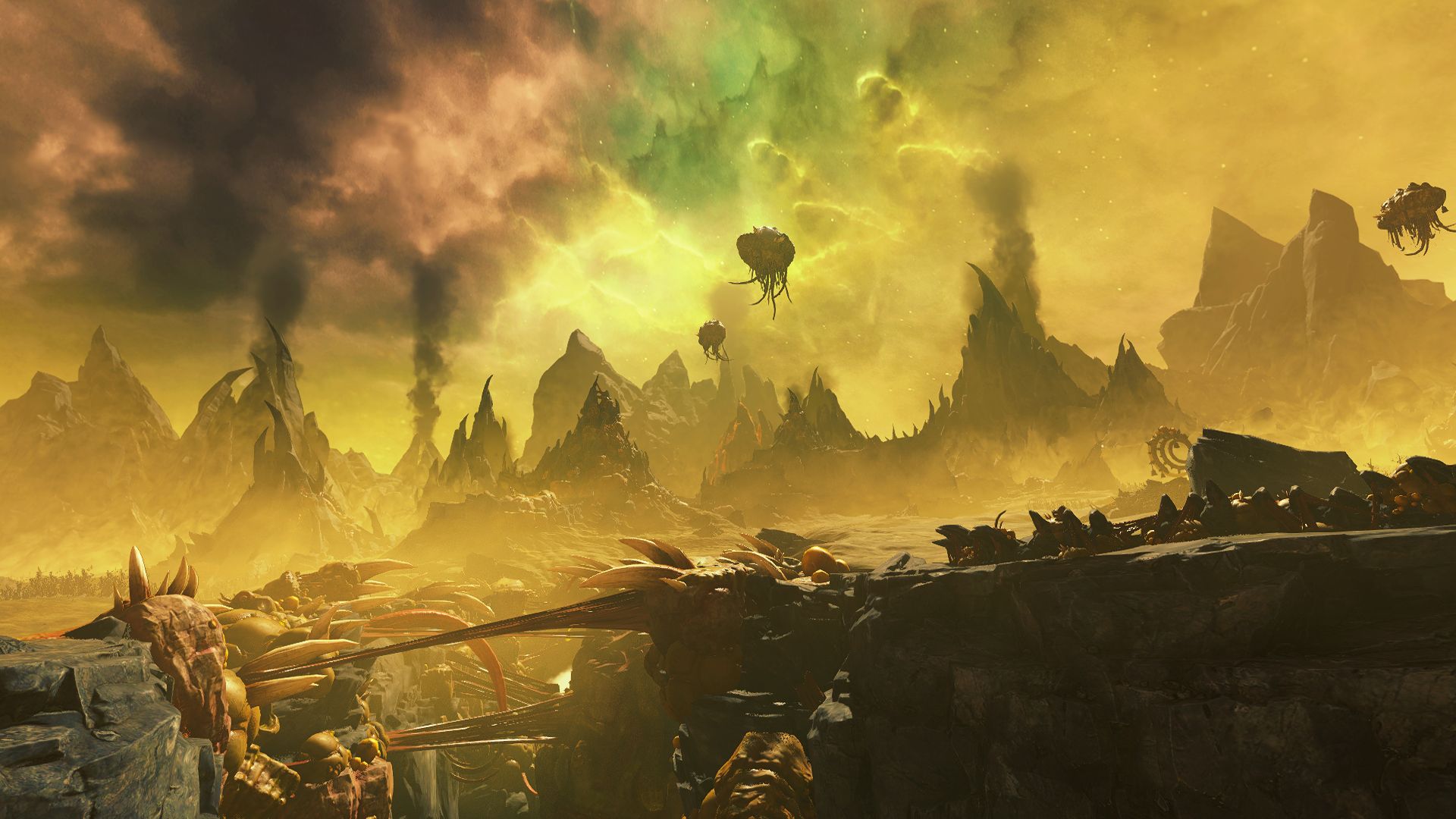Nurgle brings death and disease to the Warhammer universe—and does it with a smile
We dive into the factions of Total War: Warhammer 3.
Imagine, if you will, that there was a Chaos god of pimple popping videos, of food waste bins left abandoned over summer holidays, of offal left in a serial killer’s drain. That god would be Nurgle, the Lord of Decay: the most joyful, attentive, and ubiquitous of the Ruinous Powers.
On the face of it, Nurgle is simple to understand: a repulsive eruption of flies, pus, boils, disease, rot, blisters, and buboes. Disgust given form. But he’s more than just the Lord of Plagues. Of all the dark gods, Nurgle is the most likely to impact the ordinary lives of mortals. Khorne’s worship, for instance, is limited to those obsessed with bloodshed. Tzeentch appeals to those who desire power, change, and self-advancement. Slaanesh is for the horny.

We've partnered up with Sega to create The Tome of Knowledge, a series of articles and videos that showcase the flavour, personality and units of Total War: Warhammer 3's factions.
By contrast, most ordinary people will eventually feel Nurgle’s presence. He embodies the constant cycle of death and rebirth that defines all things—the personification of the fear of mortality and decay, as we face the rolling wheel of time that will, eventually, grind us all to dust. He’s a generous god, too, keen to bestow the fruits of his cursed labours on rich and poor alike. Whereas his great rival, Tzeentch, is obsessed with change, Nurgle teaches us to embrace the numbing inevitability of despair; to face decay and debasement with a big, rotting grin. And that’s why many afflicted mortals, desperate to ease their suffering, turn to him.
Nurgle’s fascination with the plight of lesser beings sets him apart from his brothers. Of all the Chaos gods, he has the least interest in their Great Game of supremacy. They view Nurgle like a cheerful idiot, derailing their dark planning sessions with anecdotes about ailments and infections—the Chaos equivalent of a chatty idiot on a Zoom call. But Nurgle is patient and the spread of his influence is inevitable. And when his plagues start erupting everywhere, he has the capacity to surpass even Khorne in strength and influence. Contagion, rather than brotherly competitiveness, is what motivates Nurgle, but he does feel enmity. Khorne’s reckless urges are at odds with Nurgle’s patient, nurturing nature. Slaanesh’s torpour revolts the perpetually industrious Plague Lord. And he has a special hatred for Tzeentch: whereas Nurgle delights in gradual decay and stagnation, the Changer of Ways has the patience of an insulin-resistant toddler in a bun shop.

Perhaps because of this, Nurgle is like the dad of the Ruinous Powers. Not in the sense that he won’t let you adjust the thermostat—more that he holds a fatherly regard for all his plagues, poxes, and infections. Those who embrace the Lord of Pestilence’s gifts willingly are granted unholy resilience. They’re still afflicted with disease, but instead of killing them it makes them stronger. Granted, they might look like their flesh will slough off at the first strong gust of wind, but in reality, true followers of Nurgle can shrug off most mortal wounds.
This sickening resilience is reflected in the army roster, which lollops towards the enemy line with the same grim inevitability that defines Nurgle. At the head of his forces you’ll often find a Great Unclean One: vast, corpulent masses of rotting flesh and erupting monstrosities, capable of battering enemy forces and casting potent spells. Hordes of delighted, jittering Nurglings roll into battle ahead of the main line: tiny, malevolent, ankle-biting monstrosities who are as entertaining as they are obscene. And where other armies have fast cavalry, Nurgle has Plague Toads: bags of bags of brackish filth who can pulverise lighter units with their disgusting bulk. The feel of the army is encapsulated horribly by the Beast of Nurgle: basically an over-friendly labrador made of medical waste. It craves attention and is desperate to make new friends—probably because all its previous friends were crushed, poisoned, or crushed while being poisoned.
Why would you want to play as Nurgle? Because you want to waddle inexorably towards your enemies, gleeful in the knowledge that they can’t do anything worse to you than your daemonic patron already has. Because you want to smother your foes with cankerous flesh and choke them with buzzing flies. Because Nurgling acrobatics. And you’ll do it all with a smile on your face, rot in your heart, and the sound of clanging bells in the place where your ears would be if they hadn’t rotted and fallen off. Thank you, Grandfather Nurgle.
Keep up to date with the most important stories and the best deals, as picked by the PC Gamer team.

